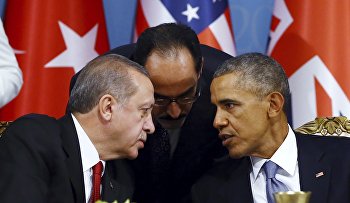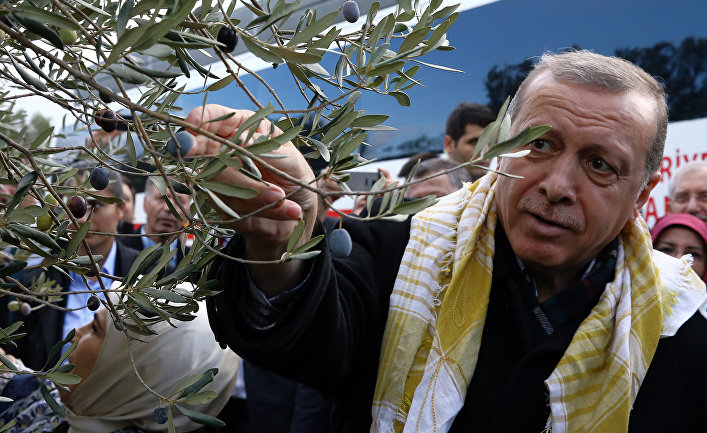After the Turkish Air Force downed the Russian SU-24 bomber, all eyes were set on Russia and its possible military response. Some analysts started to speak about Turkey's military power, while others began to speculate who will be the ultimate winner of this conflict, waiting for Russia's next move. However, few realized that the winner was found on the very first day of the incident. It was Russia.
During the last four years, Turkish President Recep Tayyip Erdogan has proved that he has a particular interest in political intrigues. He seemed to coordinate his actions with Pentagon or execute its positive order (although the last mentioned is less likely). He gave the order to destroy a Russian fighter, and then kept on insisting that the reason for this willful trick was violation of the Turkish border by the Russian bomber, as well as its ignorance of the Turkish Air Force's warnings. It is obvious that such statement is just an excuse, because there was no need to shoot the Russian plane if it were true. First, Russia clearly has no interest in entering Turkey's airspace. Second, it is quite common for a fighter jet fulfilling a task in the border areas to emerge in the airspace of a neutral country for a few seconds, and usually nobody fires at it. Now we can only assume that Turkey is not a neutral country, and that's actually the way it really is. Thus, for example, Russia Today News Agency mentioned in one of its articles: "Only in 2014, Turkey invaded Greek airspace more than 2,200 times. It is also known for certain that during the last four years, Turkish fighter jets regularly violated Syrian air borders. "
BREAKING: Russia warns #Turkey of consequences of Ankara's 'reckless actions' https://t.co/YKqzO9jAnw pic.twitter.com/kq8GXsKDOe
— Sputnik (@SputnikInt) December 13, 2015
So it is obvious that Turkish attack was committed intentionally and in coordination with the Pentagon and Incirlik air base. This act was a naive mistake on the part of Turkey and the Pentagon. As a result, Russia, having two dead (one pilot and a crew member killed during the rescue mission) and one warplane down, scored an undeniable advantage, which will help it come out victorious from this confrontation.
First of all, it must be recalled that only two days after the Turkish attack on a Russian bomber, Russian Air Force bombed and destroyed at least 20 Turkish trucks which had entered Syrian territory, and as a result, killed seven Turkish drivers. This news was first reported by Anadolu Turkish news agency, and then by Reuters. As Russian media did not give much importance to it, likewise Western press decided not to focus on it either. As a result, this event didn't make it the news in the Western media (which incidentally was for the benefit of Russia). Nevertheless, this fact didn't change the actual state of things: Moscow has taken a large-scale military measure and revenged the attack. Yet another apparent demonstration of Russia's victory was the fact that only a few hours after the attack on its bomber, it declared that it would deploy S-300 air defense systems in Syria, furnishing it with new fighters.

From now on, it will send its warplanes on a mission accompanied by its military rocket planes and will immediately destroy any potential threat that can arise in the the direct proximity. In other words — Turkish reckless act, gives Russia an advantage to not only deliver the latest air defense system while expanding its fleet in Syria, but also to establish a new rule for its counterparts, including Turkey, the US, and its NATO allies, meaning that if one keeps on interfering with its intervention in Syria, they will be met with a resonant defense.
Another favorable factor for Russia is that NATO's European members unequivocally disowned Turkey in the conflict. Of course, the US President Barack Obama and NATO Secretary General Jens Stoltenberg expressed their support for the Republic of Turkey from the very start of tensions. However, according to the news from Italian NATO Summit, France, Germany and some other members of the organization, such as Greece and partly Great Britain were seriously displeased with this Turkish act. Novosti Information Agency reported that the French representative voiced his protest against Turkey at a NATO meeting. He said: "This country's leadership nullifies the efforts of the anti-ISIL coalition."
ISIS would never have metastasized as virulently as it has without Turkey’s assistance https://t.co/gWkFxL6Bf4
— Mahir Zeynalov (@MahirZeynalov) December 9, 2015
The conflict kept escalating when the German Vice Chancellor Sigmar Gabriel, took the liberty to openly criticize Turkey. All this means that a split within NATO is starting to take place, being very beneficial for Moscow and accommodating Europe's indirect support of Russia's policy in Syria. It is particularly obvious now, when the terrorist attacks in Paris forced France to approach Moscow. It's even possible that after Turkey's atrocious event European countries could require its exclusion from NATO. Nevertheless, it is also clear that the Turkish attack on the Russian warplane damaged Ankara's accession to the European Union.
Global public opinion is another important factor in this conflict. People around the world, being aware of ISIL crimes and the serious threat it poses, clearly understand that Turkey, with the support of the US, has destroyed the Russian bomber, which was carrying out a mission bombing ISIL positions in Syria. Moreover, Turkey keeps supplying ISIL with arms while buying oil from the terrorist organization. As a result, Russia regained the status of a world power fighting against fundamentalist criminals, while Turkey finds itself narrowed to the position of ISIL and its sponsor.
Turkey should not only not become an EU member as long as it continues backing #ISIS, but also be removed from #NATO https://t.co/LvEuE7JKWw
— Richard Woolley (@beingrichard) December 13, 2015
However, after downing the Russian bomber, Turkey has lost one of its primary assets. Being a NATO member, Ankara could've created certain problems for Russia. But now given all the facts, it's clear that Russia was on the right side of the hedge in this conflict, which blew up from Turkey's mindless actions and ended with unfavorable results for itself, as well as for the Pentagon, NATO, and of course, ISIL.






